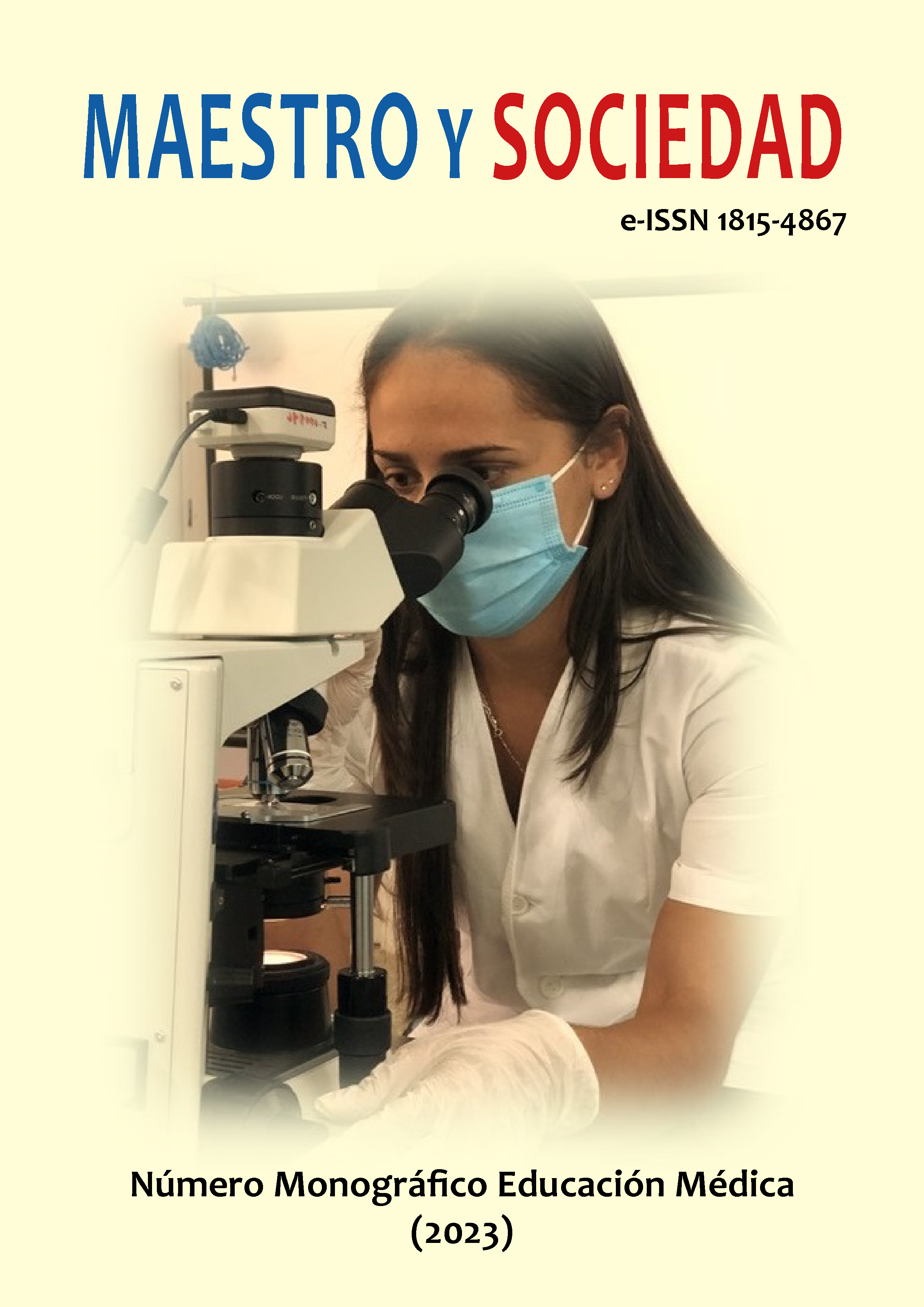Use of the educational resources opened up in the subject Clinical Pharmacology
Use of the educational resources opened up in the subject Clinical Pharmacology
Keywords:
open educational resources; methods of teaching learning; clinical pharmacologyAbstract
Introduction: A descriptive cross-sectional study was carried out with the objective of verifying the use of open educational resources, in the teaching of clinical Pharmacology at the University of Medical Sciences of Santiago de Cuba, during the second semester of the 2020-2021 academic year. Materials and methods: To develop the above, a record of the use by 150 third-year medical students of the virtual classroom of said institution was made, to which a survey was applied. Results: 56,6 % of the disciples used the open educational resources designed for learning the subject, 100 % of the students accessed the question guides designed with a view to fulfilling the general objectives of the discipline and 63,3 % of students consider that the educational resources used in teaching are excellent. Discussion: The use of new information technologies has constituted a novel finding within the sciences in the world in general, the implementation of different didactic methodological platforms has revolutionized all the ways of doing and teaching, for which the sciences of education have within their proposals to impart content regardless of the specialty, the use of information technologies as active support, in order to develop self-directed study in students. Conclusions: The use of open educational resources for the learning of clinical pharmacology in third-year students of the Medicine career was an effective teaching method for learning the discipline, it improved the self-directed study in the students and showed a high acceptance, among them.
References
Aramendi, P. A. (2018). El aprendizaje basado en la indagación en la enseñanza secundaria. Revista de Investigación Educativa, 36(1), 109-124. http://dx.doi.org/10.6018/rie.36.1.278991
Barba, R. S. (2018). “Presencia, participación y progreso”: el aprendizaje basado en proyectos en la trayectoria de una maestra en formación. Revista Electrónica Interuniversitaria de Formación del Profesorado, 21(2), 13-25.
Baser, D. Y. (2017). Collaborative project-based learning: an integrative science and technological education Project. Research in Science and Technological Education, 35(2), 131-148.
Campos, J. y. (2017). Futuros acerca de la profesión docente desde la mirada del alumnado de carreras de educación. Journal of New Approaches in Educational Research, 6(2), 87–92.
Chancusig Chisag, J. C. (2017). Didácticos interactivos a través de las TIC´S en el proceso de enseñanza matemática. Boletin Virtual, 6(4), 112–133. https://dialnet.unirioja.es/descarga/articulo/6119349.pdf
Chu, S. Z. (2017). The effectiveness of wikis for project-based learning in different disciplines in higher education. Internet and Higher Education, 33, 49-60.
Moreno De la Cruz, A. D. (2018). Método basado en las TICs para la enseñanza de las operaciones elementales en la educación básica. [Trabajo de Grado. Colombia].
Rivas A, A. F. (2017.). Cincuenta innovaciones educativas para escuelas. Buenos Aires: CIPPEC y Santillana.
Rodríguez Delis, Y. M. (2018). Adopción y uso de Recursos Educativos Abiertos en Educación Superior. [Tesis de doctorado. Universidad de Granada].
Sebastián, T. (2017). Del aula al laboratorio. Tabakalera. https://www.tabakalera.eu/sites/default/files/adjuntos/2017/ikasgelatik_es_ baja_1.pdf
Torres, A. y. (2017). Tendencias Educativas Contemporáneas del aprendizaje en red: Retos y Perspectivas. Curso 11.Congreso Pedagogía, Universidad Agraria de La Habana.
Villarroel, V. B. (2019). Using principles of authentic assessment to redesign written examinations and tests. Innovations in Education and Teaching International, 57(1), 38-49. https://doi.org/10.1080/1
Walss Aurioles, E. (2021). Diez herramientas digitales para facilitar la evaluación formativa. Tecnología. Ciencia y Educación, 18, 127-139. https://doi.org/10.51302/tce.2021.575
Zhang, X. (15 de September de 2020). Revisiting Textbook Adaption Through Open Educational. Resources: An Inquiry into Students’ Emotions. Research in Open and Distributed Learning, 21(3), 197–210. https://doi.org/10.19173/irrodl.v21i3.4775
Zulkifli, N. A. (2021). Online Applications to Support Remote Classroom. Dialogue and Assessment. Journal of Physics: Conference Series, 1779. doi:10.1088/1742-6596/1779/1/012039
Downloads
Published
How to Cite
Issue
Section
License
Copyright (c) 2023 Neity Mendo Alcolea, Dania Diaz Marin, Luis Ricardo Manet Lahera

This work is licensed under a Creative Commons Attribution-NonCommercial-NoDerivatives 4.0 International License.
This journal provides immediate open access to its content, based on the principle that offering the public free access to research helps a greater global exchange of knowledge. Each author is responsible for the content of each of their articles.



























 Universidad de Oriente
Universidad de Oriente 